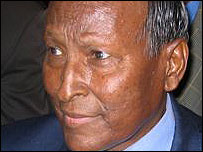The history of Somalia and Ethiopia is marred by distrust, animosity and war. Suspicion of neighbouring expansionism and political extremism is deeply rooted in both states.
By Mohammed Adow
BBC News
Reports that Ethiopian troops have crossed Somalia's border and setup camp in Baidoa, home to the weak Somali transitional government, will not surprise seasoned observers of the often stormy relationship between the Horn of Africa rivals.
Ethiopia has often seen Somalia as a territory from where attacks against it could be launched.
This fear became even more real after Somalia descended into anarchy 15 years ago and the country was divided into armed fiefdoms controlled and ruled by warlords.
Rebel fears
As Somalia has had no central authority, Ethiopia has often driven its forces into Somali territory - ostensibly to protect itself as well as to support friendly warlords.
For Ethiopia, its long and porous border with Somalia allows possible militant elements to take advantage of its neighbour's lawlessness.
The existence of its own active rebel groups - namely the Oromo Liberation Front and the Ogaden National Liberation Front (a group of Somali origin) - has exacerbated these fears.
Ethiopia repeatedly denies its incursions into Somalia, perhaps fearing international vilification.
But on a reporting trip to south-western Somalia six years ago, I had a firsthand encounter with Ethiopian forces on Somali soil.
In Bula Hawo, near the Kenyan border, the town's administration desperately wanted coverage of a drought that was ravaging the region. One of the officials took me to an officer in charge of the Ethiopian troops garrisoned there, to get permission for me to travel in the region. The letter I was issued enabled me cross safely through the Ethiopian checkpoints in the Somali towns of Dolow and Luq.
Bad blood
Both Ethiopia and Somalia belong to several regional bodies including the Intergovernmental Authority on Development (Igad) and The African Union (AU), which have been instrumental in the current peace process.

President Abdullahi Yusuf is a long-time ally of Ethiopia |
The bad blood between the two nations reared its ugly head again when Igad unveiled recent plans to send regional peacekeeping troops to Somalia. Many Somalis were outraged at the thought of Ethiopian troops - even peacekeeping ones - being deployed. Ethiopia has also been uneasy with the military successes of the Union Islamic Courts (UIC), the Islamists who have pacified the capital, Mogadishu, and now control huge swathes of southern Somalia.
Yet the vehement rejection of Ethiopian peacekeepers and Ethiopia's stern warnings to the UIC not to attack Baidoa mirror deep-seated suspicions that have characterised their relations dating back to 1960, when Somalia gained independence.
Bloody wars
Somalia has always maintained that Ethiopia occupies a part of its territory - the Ogaden region - ceded by British colonialists to Ethiopia. Ethiopia disagrees and the failure of the Organisation of African Union (now the AU) to resolve the dispute led Somalia to declare war on Ethiopia in 1964. It also sponsored an Ethiopian rebel movement against the then-government of Emperor Haile Selassie.
But it is the 1977 Ethiopia-Somalia war that lingers more prominently in the minds of the people of the Horn of Africa. The conflict was not only bloody but also costly to both nations and it did not in any way alter the situation in Somalia's favour. It is also worth noting that as Somalia slipped into anarchy, the neighbours were sponsoring each other's rebel movements.
Threat
No-one understands better than the current Ethiopian Prime Minister Meles Zenawi what a threat an unfriendly Somalia poses to Ethiopia. He knows Somalia very well, as he lived in Mogadishu when he was a liberation leader in the 1980s. He came to power toppling Mengistu Haile Mariam in 1991, the same year the Somali government collapsed. With his ascent to power came the search for a favourable regime in Somalia.
Somalia's interim government, led by long-time Ethiopian ally Abdullahi Yusuf, has offered Ethiopia this hope. Thus any other power threatening to overthrow Mr Yusuf's administration will be viewed as an aggressor against Ethiopia that must be fought at whatever costs.




